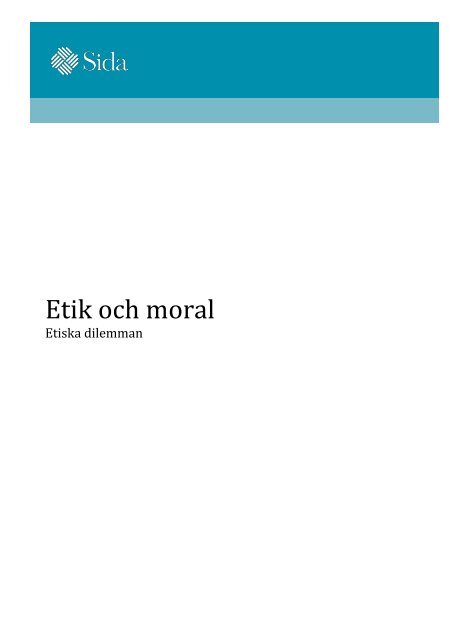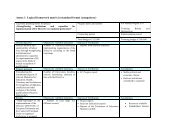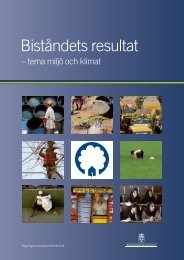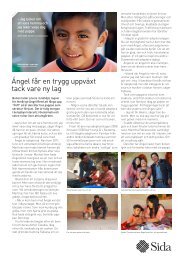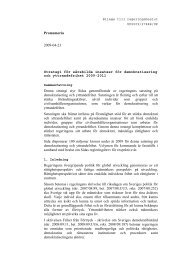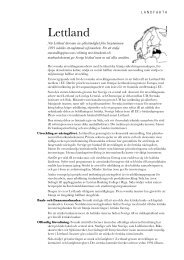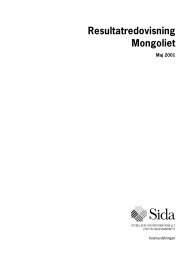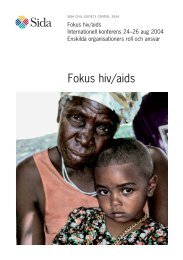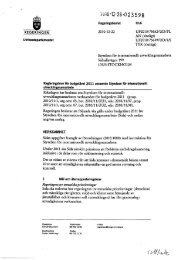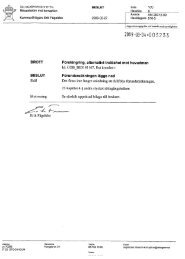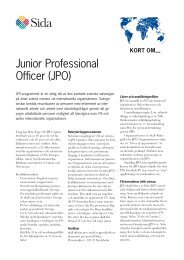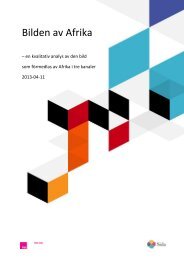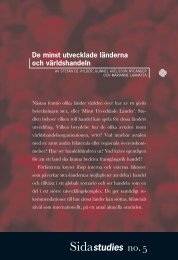480. Etik och moral - Sida
480. Etik och moral - Sida
480. Etik och moral - Sida
You also want an ePaper? Increase the reach of your titles
YUMPU automatically turns print PDFs into web optimized ePapers that Google loves.
<strong>Etik</strong> <strong>och</strong> <strong>moral</strong><br />
Etiska dilemman
Innehåll<br />
Case 3: Witness to murder ........................................................................................................................................... 2<br />
Case 4: Hiding a Suspect ................................................................................................................................................. 3<br />
Case 5: Anonymity Declined ........................................................................................................................................... 4<br />
Case 6: Anonymity Revisited .......................................................................................................................................... 5<br />
Att diskutera - Svar .......................................................................................................................................................... 6<br />
Ett etiskt dilemma ............................................................................................................................................................ 7<br />
<strong>Etik</strong>, Moral <strong>och</strong> etiska dilemman ..................................................................................................................................... 8<br />
Etiskt dilemma i vården, problem .................................................................................................................................. 10<br />
Ett forskningsetiskt dilemma ......................................................................................................................................... 11<br />
1
Att diskutera. #1<br />
Case 3: Witness to murder<br />
Mary Thompson had been conducting fieldwork in a Southeast Asian community for l8 months. Her house<br />
was ideally located on the edge of the village plaza, allowing her to readily observe daily activities that<br />
took place in the plaza. In addition to gatherings of women who shared food preparation tasks and<br />
talk, and groups of men working individually on carvings, the plaza was regularly a gathering place for<br />
men at night.<br />
One night while Thompson was working up some statistical problems in her house, she was<br />
distracted by loud, seemingly argumentative discussions in the plaza. When the noise of the<br />
argument reached a high pitch, she decided to investigate the situation. Just as she stepped from her<br />
doorway, she saw one of the men in the group of five, angrily raise his machete and deliver a deadly<br />
blow to another—Tom—in. the group. Stunned silenced fell over the other three men, as they<br />
watched their companion quickly bleed to death before their eyes. Moments later people from the<br />
other houses began moving in to the plaza in response to the wailing that came from the man who bad<br />
wielded the machete. Mournful crying and walling was carried throughout the village. The family<br />
members of the dead man carried him to their home and began funeral preparations. The next<br />
evening, Tom was buried. The man who bad dealt the deadly blow was allowed to participate in the<br />
funeral and to make a death payment to the family of the deceased.<br />
Two days after the funeral, three regional policemen came to the village. As part of a new<br />
governmental program designed to reduce blood feuds, the regional authorities now regularly<br />
sought to arrest and jail people who were involved in killings. They had heard about the recent<br />
death.<br />
They began questioning the villagers in an attempt to determine if Tom bad been "murdered."<br />
Thompson had written a detailed description of the events of the night of Thom’s death in her<br />
notebook which contained a running record of village activities.<br />
Thompson’s Dilemma: (1) Since she knew the police would question her, should ,she quickly tear<br />
out and destroy the pages in her notebook where the events were recorded? (2) When questioned by<br />
the police should she, like the other -villagers, plead ignorance concerning the killing?<br />
Vad skulle du göra? Vad tror du att Thompson faktiskt gjorde?<br />
2
Att diskutera #2:<br />
Case 4: Hiding a S uspect<br />
George Teller had been conducting research on an American Indian reservation for two years.<br />
During that time he developed strong, close relationships with many of the people who lived on the<br />
reservation. One morning while sitting at the breakfast table with the family he was staying with, the<br />
conversation became centered on an event that bad occurred one week before. This is what was<br />
recounted.<br />
Six men and five women were gathered in one of the men’s homes having a party. As the night wore on and<br />
the effects of wine and beer drinking began to be felt by the people at the party, one of the men<br />
--Ted-- went into a bedroom. He returned veering a holster which contained an ivory-handled pistol.<br />
He began showing everyone his "quick draw" and, while, doing so, one of the, other men – Mike --<br />
began teasing him. Ted responded to this teasing by putting the pistol against Mike’s forehead. The<br />
stories that went around the next day expressed confusion over how the gun happened to go off and<br />
whether or not Mike was shot right then, or whether not Ted had the gun when Mike was shot.<br />
Anyway, after the shooting everyone left Mike's home, except his girlfriend, who called the police.<br />
After taking Mike's body to the mortuary, the police arrested Ted. Ted was released the next<br />
morning after a hearing where the tribal judge charged him with involuntary manslaughter and<br />
placed him on two years’ probation. Now, at breakfast, people talked of a rumor going about the<br />
reservation that the ex-husband of Mike's girlfriend -- Joe -- had arrived at the party angry and<br />
"feeling high". Joe got into an argument with Mike and his ex-wife and wound up shooting Mike<br />
with Ted’s gun. The tribal police were questioning everyone about this possibly, particularly since<br />
Joe seemed to be the center of a lot of recent violent activities on the reservation.<br />
Teller asked his hosts if they thought Joe had killed Mike: the answer was yes and that nobody had<br />
seen Joe for several days--"he's hiding out, as usual, now that the FBI is looking for Him".<br />
Later that same day, Joe showed up at the house and asked Teller to take him to a distant town so<br />
he could catch a bus "for California". Joe said he was going back to his job for a while to earn money,<br />
and, that he would be coming back to the reservation in a couple of months. Teller looked at his host<br />
for help in deciding what to do. They looked away, leaving the decision up to him.<br />
Teller's Dilemma: Should he or should he not take Joe to the bus station? In either case, if questioned<br />
by the Tribal Police, should he tell them he had seen Joe?<br />
Vad skulle du göra? Vad tror du att George Teller faktiskt gjorde?<br />
3
Att diskutera #3:<br />
Case 5: Anonymity Dec lined<br />
Mira Walton spent two years in Melanesia conducting a broadly defined community study in a rural village<br />
with a population of about 1,500 people. She returned to the United States and wrote a 500-page descriptive<br />
monograph in which she included specific instances of conflicts of interest and dispute settlement in a variety<br />
of contexts: broken marriage contracts; instances of alleged encroachment of farming on neighbors' lands; a<br />
case of theft; a charge of mismanagement of community resources which was made against the village<br />
headman; family feuds; and blood feuds. Following the conventions of the AAA, Walton decided that the<br />
village and its location should be disguised and that pseudonyms should be used for all individuals mentioned<br />
in the published ethnography.<br />
A year after publication of Walton's ethnography, which was three years following her departure from the<br />
field, she returned to the community of study, taking along copies of the book. These copies were distributed<br />
to the people who had been most helpful during her original research project. Most of these individuals were<br />
literate and readily understood the contents of the book. Walton asked and received permission to conduct<br />
further study in the village. She settled into her task.<br />
Six months later, a meeting was called by one of the elders in order that the community members might<br />
discuss the book about them with Walton. Walton was surprised by the first remarks concerning the book;<br />
namely that, although she had done an accurate job of characterizing the situations of dispute settlement and<br />
the overall political structure of the village, they were surprised that she had (1) gotten the name of the village<br />
wrong, and (2) not given accurate names of the individuals involved in the disputes. More than 60 people<br />
were at the meeting, and these individuals represented a majority of the families in the village. The<br />
murmurings indicated strong agreement that she should have given the actual name of both the village and<br />
individuals. Furthermore, she was explicitly told that in the next book she should be more careful to use the<br />
correct village name and use the correct names of villagers who asked her to do so or who gave permission<br />
for her to do so.<br />
Ironically, Walton had debated the issue of anonymity with colleagues in the United States. She had argued<br />
that in order for further studies to be done accurately by other researchers, it was necessary to specify the<br />
precise location and name of the village. And, in order to judge credibility of information obtained from the<br />
villagers, she had wanted to provide the names of the individuals who worked most closely with her. They<br />
had argued that it was her responsibility to protect "her informants and her community" from outside<br />
interference or other possible negative consequences, and cited examples of villages and villagers who had<br />
come to harm because the anthropologists in question had used real names.<br />
Faced now with the villagers' criticisms, Walton was in a quandary.<br />
Walton's Dilemma: Given that she had a contract for a new book about the community and that the<br />
community expected her to publish this new book, should she (1) defer to the villagers' insistence that she<br />
publish the correct name of the village and the correct names of villagers who had asked or given permission<br />
for her to do so? Or, (2) should she rely on anthropological conventions and cautions (as stated in the<br />
Principles of Professional Responsibility of the American Anthropological Association) and use pseudonyms<br />
in the new book?<br />
Vad skulle du göra? Vad tror du att Mira Walton faktiskt gjorde?<br />
4
Att diskutera #4:<br />
Case 6: Anonymity Revisited<br />
Mary Jones had spent three years, 1969-72, working as an applied medical anthropologist in an urban black<br />
community in the United States. In order to provide the social science communities with some data on her<br />
project, she wrote a series of articles to be published in relevant professional journals. The data included<br />
sensitive materials concerning specific epidemiological problems faced by members of the community as<br />
well as strategies and tactics used to improve health care delivery by the local community. Before submitting<br />
her articles for publication, Jones asked specific members of the community if they would read the papers for<br />
comments and criticism. Individuals from the community health center who had been part of the applied<br />
project did so and set up a meeting for discussion of the contents of the manuscripts.<br />
The discussion began with several individuals complimenting Jones on her accurate characterization of the<br />
local situation and the sensitive way in which she addressed their health care problems and ways they chose<br />
to solve some of these. Several moments of silence passed after these initial remarks. Then an elder asked<br />
Jones why she had not given the accurate name of the community health center where much of this activity<br />
took place. Immediately, someone else asked why she had not given the accurate name of the town where the<br />
center was located. A third person asked why there were no names given for the people at the center and in<br />
the community who were involved in the project and in the "struggle to improve health care for our people."<br />
Jones countered with explanations regarding anthropological conventions which specified the use of<br />
pseudonyms in certain types of anthropological reporting, specifically if there was any chance that<br />
individuals or a community might be harmed. She provided some examples of instances in a nearby town<br />
where people had been harmed because the actual name of the town and the names of people there had been<br />
published in a scientific report. The participants at the meeting told her that she should use her own judgment<br />
in the final analysis, but they felt that even if she could not see that using the name of the health center might<br />
help them, at least she should name some of the people who had helped Jones and her students during their<br />
three years of work, even though Jones and her students were on the applied project to help the community.<br />
Jones's Dilemma: Should she defer to the community health center members' desire that she publish the name<br />
of the health center, the town in which the health center was located, and or the names of individuals who had<br />
asked or given permission for their names to be published (during the meeting described above)? Or, should<br />
she retain the use of pseudonyms throughout her papers?<br />
Vad skulle du göra? Vad tror du att Mary Jones faktiskt gjorde?<br />
5
Att diskutera - Svar<br />
Case 3: Witness to Murder<br />
Thompson's Decision<br />
Thompson decided to risk discovery of her field notes and consequently hid the notebook containing the<br />
description of the events surrounding Tom's death under coverings on her bed. When police asked her if she<br />
knew anything about Tom's death, she denied having any knowledge of the events of that evening. The police<br />
accepted her statements and did not search for her field notes.<br />
Case 4: Hiding a Suspect<br />
Teller's Decision<br />
Teller refused to provide transportation for Joe on the grounds that he was already committed to doing some<br />
work for someone else at that moment. Later in the day, when the Tribal Police came to the home of Teller's<br />
hosts, following his hosts' lead, Teller also denied having seen Joe that day.<br />
Case 5: Anonymity Declined<br />
Walton's Decision<br />
Walton finished fieldwork, returned to the United States and wrote the second book. When the manuscript<br />
was in the final stages of revision, having been accepted by a publisher, she sent a copy of the version being<br />
revised to a trustworthy friend in the village, along with a letter requesting comments on the manuscript and<br />
a direct response to the question asking if, once they saw the book, they would still want the actual name of<br />
the village used, as well as individuals' names.<br />
Walton's actions were based on the following rationales. She wanted the book to be in as near final form as<br />
possible before sending a manuscript copy to the villagers so they would have a chance to assess the overall<br />
quality and accuracy of the book and comment on it generally. This would give them a chance to make an<br />
independent judgment of the book as a whole, deciding whether or not they liked the book before deciding<br />
whether or not to have the actual name of the village and individuals published. Further, Walton feels that it is<br />
the fieldworker's responsibility to assure that informed choices are being made, when one gives informants<br />
options, thus her determination to have the context for decision making about anonymity well laid out.<br />
Walton also felt that she was obligated to make the final decisions in terms of serving the best interests of the<br />
community and the best interests of the book.<br />
Accepting the ultimate responsibility for use of names in the book, and not having any reply to her direct<br />
question regarding the use of actual names, Walton decided to use the same pseudonyms published in the first<br />
book, except when a statement about an individual would, in her judgment, be acceptable and pleasing to the<br />
person.<br />
Cage 6: Anonymity Revisited<br />
Jones's Decision<br />
Jones decided not to publish the actual name of the health center or the name of the town where she had<br />
worked. Her rationale was that, although the articles in question contained little in the way of "sensitive"<br />
materials, future publications might since such materials were in her records. She therefore chose to protect<br />
the anonymity of the community. She did, however, acknowledge the support and assistance of specific<br />
community people (by name) in footnotes to the articles.<br />
6
debatt<br />
Redaktör: Jan Lind 08-790 34 84 fax: 08-20 76 19 debattlakartidningen.se<br />
Ett etiskt dilemma<br />
I diskussionen om intressekonflikter vid publicering av medicinska<br />
artiklar har på senare tid uppmärksammats det dilemma som uppstår<br />
när bland författarna ingår forskare som är heltidsanställda i det<br />
företag som sponsrat arbetet. Någon enkel lösning på problemet är<br />
svår att se, men läsarna bör åtminstone ha klart för sig sponsorns inflytande,<br />
trots allt intygande om motsatsen.<br />
LARS WERKÖ<br />
professor emeritus, Stockholm<br />
Diskussionen om intressekonflikter i<br />
klinisk forskning, etiska problem <strong>och</strong> i<br />
viss mån frågan om avgränsning, av vad<br />
som är fusk i forskning gäller framförallt de<br />
forskare som, anställda av universitet eller<br />
annan huvudman, uppbär ersättning<br />
från de kommersiella företag de samarbetar<br />
med.<br />
De stora medicinska tidskrifternas redaktörer<br />
har gjort ett förtjänstfullt arbete<br />
med att se till att de artiklar som kommer<br />
till stånd med stöd från kommersiella intressenter<br />
innehåller uppgifter om författarnas<br />
eventuella intressekonflikter.<br />
Genomgående intygas nu att den kommersielle<br />
sponsorn inte har haft något inflytande<br />
på uppläggningen av arbetet<br />
<strong>och</strong> tolkningen av resultaten. Det är<br />
kanske framförallt de senare som varit<br />
av intresse.<br />
Heltidsanställda forskare<br />
På senare tid har emellertid ett särskilt<br />
problem kommit fram i detta sammanhang.<br />
Alltfler kliniskt betydelsefulla artiklar,<br />
framförallt gällande nya behandlingsmedel<br />
eller behandlingsmetoder,<br />
har bland sina många författare flera<br />
forskare som är heltidsanställda i det<br />
företag som sponsrat arbetet, Även i<br />
dessa artiklar förekommer en passus<br />
som talar om att företaget inte haft något<br />
inflytande i tolkningen av resultaten,<br />
samtidigt som det intygas att »samtliga<br />
författare har bidragit till utformningen<br />
av artikeln <strong>och</strong> det arbete som<br />
ligger bakom den«. Ofta intygas vilket<br />
borde vara självklart — att samtliga författare<br />
också står bakom de slutsatser<br />
som dras.<br />
Naturligtvis skall även forskare som<br />
är anställda i ett företag ha rätt <strong>och</strong> möjligheter<br />
att publicera de vetenskapliga<br />
arbeten de utför eller deltar i. Det finns<br />
alltså inte någon anledning att kritisera<br />
att företagsforskare finns med bland artikelförfattarna,<br />
Frågan som uppstår är i stället: Hur<br />
kan man intyga att »företaget« inte har<br />
haft något inflytande om dess forskare<br />
aktivt har deltagit i arbetet? En forskare<br />
som är anställd i ett företag måste genom<br />
sitt anställningsförhållande representera<br />
företaget, dess policy <strong>och</strong> ambitioner.<br />
Det är svårt att tänka sig ett företag som<br />
låter sina anställda göra uttalanden som<br />
inte är sanktionerade av företaget eller<br />
som skulle gå emot dess intressen. Genom<br />
alt en företa g sforskare aktivt deltar i<br />
ett vetenskapligt arbete kommer företaget<br />
att ha både insyn <strong>och</strong> möjlighet att påverka<br />
forskarens insatser <strong>och</strong> bidrag till arbetet.<br />
En del i marknadsföringen?<br />
Måste inte den självklara slutsatsen bli<br />
att de vetenskapliga artiklar som tillkommer<br />
med aktiv medverkan av forskare<br />
anställda i det sponsrande företaget<br />
uttrycker företagets syn på arbetets uppläggning<br />
<strong>och</strong> resultat? Kan uppgiften i<br />
uppsatsen att sponsorn inte haft något inflytande<br />
vara sann om av sponsorn anställda<br />
individer samtidigt deltagit i (<strong>och</strong><br />
därmed påverkat) arbetet med artikeln?<br />
Måste man inte se de artiklar där en eller<br />
flera företagsanställda står bland de huvudförfattare<br />
som fått ansvar att författa<br />
meddelandet till allmänheten som en del<br />
av företagets bidrag till sin marknadsföring?<br />
Det etiska dilemmat är att alla forskare<br />
som bidrar till ett arbete skall få kredit av<br />
det. Framförallt genom författarskap.<br />
När de publicerar sitt arbete kommer det<br />
från företagets vetenskapliga division.<br />
Det publicerade arbetet måste då ses<br />
som godkänt av företaget. Det utgör i realiteten<br />
en del av det arbete som företaget<br />
lagt ned på att marknadsföra sin nya<br />
produkt — det är oftast i sådana sammanhang<br />
som problemet uppstår.<br />
Läsarna måste känna till förhållandet Både<br />
tidskrifternas redaktörer <strong>och</strong> vetenskaps-<br />
samhället synes ha förbisett detta etiska<br />
problem när man accepterat arbeten från<br />
företags laboratorier. De intresse-<br />
konflikter som diskuterats i samband<br />
med stora multicenterstudier av nya<br />
läkemedel har sett mera på situa-<br />
7<br />
tionen för de akademiska än på de företagsanställda<br />
forskarna.<br />
Någon lösning på problemet är svår<br />
att föreställa sig, men det uppenbara<br />
resultatet är att läsarna av dessa uppsatser<br />
måste ha klart för sig det inflytande som<br />
sponsorn i realiteten har, trots alla intyg<br />
om motsatsen.<br />
Jag har inte velat ge något exempel<br />
eftersom det inte finns anledning att<br />
»hänga ut« någon särskild forskare, tidskrift<br />
eller företag, eftersom det jag påtalat<br />
förekommer i allt större omfattning.<br />
***<br />
Potentiella bindningar eller .jävsförhållanden:<br />
Inga uppgivna.<br />
Genom att en företagsfors- kara<br />
aktivt deltar i ett vetenskapligt<br />
arbete kommer företaget att ha<br />
både insyn <strong>och</strong> möjlighet att<br />
påverka forskarens insatser <strong>och</strong> bi-<br />
drag till arbetet.<br />
2500 Läkartidningen | Nr 32-33 | 2004 | Volym 101
<strong>Etik</strong>, Moral <strong>och</strong><br />
etiska dilemman<br />
<strong>Etik</strong> <strong>och</strong> <strong>moral</strong><br />
Det finns ett filosofiskt område som<br />
handlar om hur vi agerar i olika dilemman<br />
etiken. <strong>Etik</strong>en har rötter många tusen år<br />
tillbaka i tiden. <strong>Etik</strong> <strong>och</strong> <strong>moral</strong> är i grunden<br />
samma sak. <strong>Etik</strong> härstammar från<br />
grekiskan medan <strong>moral</strong> härstammar från<br />
latinet <strong>och</strong> betyder sed eller sedvänja. En<br />
definition av etik lyder: "De yttre normer,<br />
lagar <strong>och</strong> regler som vi förväntas att följa."<br />
Moral kan definieras som "Det praktiska<br />
handläggandet av etiska valsituationer".<br />
Det vill säga hur vi tänker <strong>och</strong> agerar inför<br />
ett etiskt problem. 1 Vad som är rätt <strong>och</strong> fel<br />
agerande varierar givetvis från land till<br />
land <strong>och</strong> från person till person. Stefan<br />
Einhorn beskriver i sin bok Konsten att<br />
vara snäll att han mött två kinesiska läkare<br />
som reagerat våldsamt på att vi berättar för<br />
patienter i den svenska sjukvården att de<br />
har drabbats av cancer. "Men då dödar ni<br />
dem i förtid. Vi tycker ni är oetiska!", hade<br />
de sagt upprört. 2<br />
Etisk verktygslåda<br />
Det finns några verktyg som kan hjälpa Oss<br />
människor att välja rätt i etiska dilemman.<br />
Det första verktyget är att följa vårt<br />
samhälles lagar, regler som normer. Vi<br />
anser exempelvis att alla människor är lika<br />
värda, att vi skall värna om alla liv <strong>och</strong> att<br />
alla människor har rätt att fatta beslut om<br />
sitt eget liv <strong>och</strong> att man skall dela med sig<br />
till dem som har det sämre ställt. Ibland<br />
kommer dessa på kollisionskurs,<br />
exempelvis när en ung tjej tvingas ta<br />
ställning till om hon skall göra abort, vilket<br />
värde är viktigast, den unga tjejens rätt att<br />
fatta beslut om sitt eget liv eller att vi skall<br />
värna om alla liv. För det andra har vi vårt<br />
förnuft, genom en rationell analys kan vi<br />
bedöma hur vi kan göra så gott som<br />
möjligt <strong>och</strong> hur vi undviker ont. Det tredje<br />
—<br />
1<br />
Einhorn, Konsten att vara snäll, s. 20f<br />
2<br />
a.a. s. 78<br />
8<br />
verktyget är vårt samvete, som fungerar<br />
som inre kompass <strong>och</strong> talar om för Oss vad<br />
som är gott <strong>och</strong> vad som är ont. Det fjärde<br />
verktyget är vår empatiska förmåga, det<br />
vill säga vår kapacitet att tänka in oss in en<br />
annan människas värld. Denna kan hjälpa<br />
oss att först hur andra människor tänker,<br />
denna kan vi sedan använda för att göra<br />
gott eller inte. Det femte verktyget är våra<br />
medmänniskor, som vi kan använda oss i<br />
svåra dilemman som bollplank. 3<br />
Etiska dilemman<br />
Etiska dilemman hör till vår vardag. Det<br />
kan handla om att stanna på gatan för att<br />
hjälpa någon som har fått motorstopp, <strong>och</strong><br />
riskera att komma sent hem. Eller om man<br />
ska ta sig tid att diska ur kaffekoppen i<br />
lunchrummet <strong>och</strong> därmed komma sent till<br />
ett möte. Eller om man ska orka hälsa på<br />
sin arbetskamrat långt bort i korridoren<br />
eller morgontrött smita in på sitt rum. 4<br />
Här följer några etiska dilemman som kan<br />
fungera som diskussionsunderlag.<br />
Dilemma 1<br />
En dag ringer en god vän gråtande upp dig.<br />
Hon är lycklig med sin man, men han är<br />
mycket svartsjuk. Hon har nu ätit middag<br />
med sin före detta partner. Mötet var helt<br />
oskyldigt, men hennes man har fått reda på<br />
att de setts på stan <strong>och</strong> blivit rasande. Din<br />
vän bönar <strong>och</strong> ber dig intyga att ni två varit<br />
ute tillsammans på kvällen <strong>och</strong> att den före<br />
detta partnern av en slump dykt upp en<br />
kort stund. Kan du tänka dig att duga för<br />
din goda väns skull? 5<br />
Dilemma 2<br />
En arbetskamrat har presterat allt sämre de<br />
senaste månaderna. När du talar med henne<br />
om detta avslöjar hon att hennes son blivit<br />
psykiskt sjuk <strong>och</strong> försökt att ta sitt liv. Hon<br />
får dig att lova att inte berätta för någon.<br />
Några veckor senare träffar du din chef,<br />
som säger att han planerar att avskeda din<br />
3 a.a., s. 35<br />
4 a.a., s. 27<br />
5 a.a., s. 19f
arbetskamrat <strong>och</strong> att ledningsgruppen skall<br />
fatta beslut om detta på eftermiddagen.<br />
Dina protester hjälper inte, men du anar att<br />
hans hjärta skulle vekna om du berättade<br />
sanningen. Du kan inte få tag i din<br />
arbetskamrat. Bryter du ditt löfte <strong>och</strong><br />
berättar för chefen? 6<br />
Dilemma 3<br />
a) En bekant till författaren av boken<br />
Konsten att vara snäll, Stefan Einhorn,<br />
arbetade för några år sedan på ett litet<br />
företag. Där fanns sammanlagt sex<br />
anställda, förutom chefen, som också var<br />
företagets grundare. Den person som<br />
ansvarade för försäljningen hade arbetat<br />
tillsammans med chefen i närmare tjugo år.<br />
De kände varandra mycket väl <strong>och</strong> deras<br />
familjer umgicks på fritiden.<br />
Försäljningschefen var nu över sextio <strong>och</strong><br />
hade de senaste, åren fått allt svårare att<br />
hänga med i utvecklingen speciellt inom<br />
dataområdet. Hans misstag blev allt fler<br />
<strong>och</strong> han tedde sig ibland förvirrad. Chefen<br />
var naturligtvis bekymrad över situationen<br />
<strong>och</strong> övriga medarbetare påpekade allt<br />
oftare att något måste göras. 7<br />
Vad skulle ni göra i den här situationen?<br />
b) 1 verkligheten blev följden denna: Chefen<br />
hade inte hjärta att säga upp sin gamle<br />
vän <strong>och</strong> medarbetare så nära<br />
pensioneringen <strong>och</strong> valde till slut att<br />
anställa en assistent, som i realiteten tog<br />
över många av försäljningschefens<br />
upp g ifter. Samtidigt blev tiderna kärvare<br />
<strong>och</strong> omsättningen sjönk. Den extra<br />
anställningen, som medförde att två<br />
personer i realiteten gjorde en persons<br />
arbete, bidrog till att företaget gick i<br />
konkurs. Samtliga anställda förlorade sina<br />
arbeten. 8<br />
Var det ändå ett riktigt beslut av chefen?<br />
Dilemma 4<br />
6<br />
Ibid<br />
7<br />
a.a,. s. 24f<br />
8<br />
Ibid<br />
9<br />
Säg att du är tio år äldre <strong>och</strong> har barn. Du<br />
brukar skicka dem på sommarläger över en<br />
tid under sommarlovet. En dag åker du ut<br />
för att hälsa på dem. Dina barn hade bönat<br />
<strong>och</strong> bett om att du skulle ta med chips,<br />
godis <strong>och</strong> läsk. När du kommer fram<br />
kommer den huvudansvarige för lägret <strong>och</strong><br />
tittar i din väska <strong>och</strong> säger: "Vet att du inte<br />
att det är förbjudet att ta med godis till<br />
barnen? Det är en rättvisefråga!"<br />
Hur agerar du?<br />
Är det alltid rätt an följa regler?<br />
Dilemma 5<br />
På din arbetsplats har en ny person<br />
anställts. Snart upptäcker ni att han luktar<br />
så starkt av svett att alla undviker an gå<br />
nära honom. Några har tagit upp det med er<br />
chef, som generat skrattat <strong>och</strong> sagt att det<br />
är den anställdes ensak hur ofta han vill<br />
duscha. Ingen av arbetskamraterna<br />
förefaller benägen att agera. Hur agerar du i<br />
detta läge? Vilka konsekvenser kan ditt<br />
agerande få?<br />
Dilemma 6<br />
Den moderna gentekniken har gjort det<br />
möjligt att fastställa om någon bär anlag<br />
för ärftli g a cancersjukdomar. När en<br />
person bär på ett sådant anlag är risken ofta<br />
50 procent att barn <strong>och</strong> syskon bär på<br />
samma anlag. För den som har detta anlag<br />
är risken i regel stor att utveckla cancer,<br />
ibland i unga år.<br />
Föreställ dig nu en situation där du läkare <strong>och</strong><br />
behandlat en kvinna med bröstcancer. Det<br />
visar att kvinnan bär på anlaget för<br />
bröstcancer, men hon vägrar att informera<br />
sin yngre syster, som hon inte har haft<br />
kontakt på flera år, om att hon i sin tur<br />
löper en 50-procentig risk att ha anlaget.<br />
Om den yngre systern inte får denna<br />
information är risken stor att hon får en<br />
allvarlig sjukdom, kanske i unga år. Om du<br />
informerar lillasystern blir möjligheterna<br />
att förebygga betydligt större, men då<br />
bryter du mot lagen <strong>och</strong> riskerar att bli
Etiskt dilemma i vården, problem<br />
Zahia är muslimsk kvinna som under hela sitt liv har varit en god <strong>och</strong> troende muslim.<br />
På sina äldre dar bor hon nu på ett äldreboende. Hon är inte dement, men hon är efter en<br />
hjärnblödning förlamad på kroppens högra sida. Hon sitter i rullstol <strong>och</strong> har svårt att sköta sin<br />
hygien själv.<br />
Nu är det sommartid vilket innebär en hel del ny personal i form av vikarier.<br />
Johan är en av de lyckliga som har fått sommarjobb. Den här natten ska han jobba tillsammans med<br />
Maria.<br />
När han kommer till arbetsplatsen får han veta av kvällspersonalen att Maria har anmält sig sjuk.<br />
Bemanningen ordnar en annan vikarie istället. Johan stämmer av med kvällspersonalen <strong>och</strong> får veta<br />
att Zahia har mått dåligt. Hon har kräkts <strong>och</strong> har haft diarré <strong>och</strong> hon är orolig. Sjuksköterskan har<br />
tittat till henne tidigare under kvällen <strong>och</strong> skulle återkomma morgonen därpå.<br />
Precis när kvällspersonalen har gått dyker vikarien upp. Vikarien heter Peder. Johan vet att det här<br />
kan innebära problem. Zahia vill pga sin religion inte bli omhändertagen av män. Om det kan<br />
undvikas vill hon helst inte ha dem i sitt rum eftersom att hon inte på egen hand kan ta på sig sin<br />
slöja innan de kommer in till henne.<br />
Johan berättar för Peder hur det ligger till <strong>och</strong> de kommer tillsammans överens om att de ska ringa<br />
bemanningen. Efter ett samtal kan de konstatera att det inte finns någon annan vikarie <strong>och</strong> ingen av<br />
de ordinarie vill avbryta sin semester.<br />
Larmet ringer <strong>och</strong> när Johan svarar talar Zahia om att hon behöver gå på toaletten.<br />
Hur ska de göra? De måste sköta sitt arbete samtidigt som de respekterar Zahias religion.<br />
Några saker att tänka på:<br />
• Zahia har rätt till sin integritet<br />
• Zahia har rätt att säga ifrån när det gäller män i vården. Lagen ger henne stöd i detta<br />
• Johan <strong>och</strong> Peder får absolut inte tvinga Zahia till något hon motsätter sig<br />
Vilka följder kan det få om Johan <strong>och</strong> Peder inte hjälper Zahia till toaletten?<br />
Vilka blir följderna om de hjälper henne trots hennes önskan?<br />
Vilket är det bästa alternativet ur vårdetiskt <strong>och</strong> humanistiskt perspektiv?<br />
De är ensam nattpersonal på 4 avdelningar så det finns ingen möjlighet att kalla in personal från en<br />
annan avdelning.<br />
10
Ett forskningsetiskt dilemma<br />
Vad ska en forskare göra, om han eller hon kommer fram till något som inte "går" att<br />
publicera? Inom samhällsvetenskaperna har jag ibland träffat på detta problem. En<br />
forskare berättade till exempel att hon hade gjort intervjuer för att få veta mer om hur<br />
en viss grupp i samhället levde <strong>och</strong> vilka normer de ansåg viktiga. När hon upptäckte<br />
att det skulle öka fördomarna (eller motviljan) mot den här gruppen om hon<br />
offentliggjorde sina rön, valde hon att inte göra det.<br />
"Sök sanningen! Och förde den dig till helvetets portar, så<br />
klappa på!" Detta råd som tillskrivs filosofen Benjamin Höijer<br />
(1767-1812) har väckt både beundran <strong>och</strong> förargelse. Ett<br />
problem med att följa rådet är att inte bara forskaren själv utan<br />
även - <strong>och</strong> framför allt - de som är föremål för forskningen<br />
riskerar att hamna i helvetet på grund av sanningssägandet.<br />
Sanning eller hänsyn, vad ska prioriteras? Detta är ett<br />
verkligt dilemma, för hur man än gör blir det inte bra.<br />
Forskare lever inte i ett lufttomt rum, <strong>och</strong> forskningen står inte<br />
bortom gott <strong>och</strong> ont. Men hur mycket hänsyn ska forskaren ta<br />
till vad som för tillfället är gångbart i samhället? Dagmar<br />
Lange, mer känd som deckarförfattaren Maria Lang, fick sitt<br />
avhandlingsarbete fördröjt då hon hade upptäckt att föremålet<br />
för hennes studium, Pontus Wikner, var homosexuell. På<br />
1940-talet var detta inte lämpligt att säga om en "vitter"<br />
författare.<br />
Charles Darwin väntade i tjugo år med att offentliggöra sina<br />
rön om evolutionen, <strong>och</strong> att han inte väntade ännu längre än till<br />
1859 med att ge ut sin bok om arternas uppkomst anses bero på<br />
att han fick veta att Alfred Russel Wallace var honom i hälarna<br />
med sin snarlika upptäckt.<br />
Darwin förstod att hans rön skulle väcka förargelse <strong>och</strong> ville ha<br />
starka belägg för att han hade rätt innan han vågade publicera.<br />
Han verkar ha varit mycket medveten om att det finns andra<br />
krafter än rent intellektuella som påverkar vilket bemötande en<br />
forskare får. Argument kan väga lätt när det vill sig illa. I en<br />
anteckningsbok skriver han att det inom praktiskt taget alla<br />
vetenskapsområden används repressiva metoder för att hindra<br />
publicering, förvägra någon en professur eller att i pressen<br />
förfölja någon med invektiv <strong>och</strong> förlöjliganden. Detta leder till<br />
att den som har impopulära idéer håller inne med dem,<br />
publicerar anonymt, presenterar sina idéer i försvagad form<br />
eller skjuter upp publiceringen i många år.<br />
Robert Malthus hade publicerat sin bok "An Essay on the<br />
Principles of Population" anonymt 1798. Den boken blev en<br />
avgörande inspirationskälla för Darwin. En annan föregångare<br />
till Darwin var Robert Chambers, som 1844 hade gett ut en bok<br />
11<br />
med titeln "Vestiges of the Natural History of Creation"<br />
anonymt. Den väckte stor förargelse, <strong>och</strong> geologer' Adam<br />
Sedgwick skrev i ett brev till sin kollega Charles Lyell att "om<br />
boken är sann, är religionen en lögn". Lyell, en av Darwins<br />
mentorer, ska ha instämt <strong>och</strong> sagt att om boken var sann, vore<br />
"all vår <strong>moral</strong> förgäves". Man kan förstå att detta höll tillbaka<br />
Darwin.<br />
Den som "bara" är ute efter sanningen <strong>och</strong> inte efter att göra<br />
karriär på sin forskning, kan kosta på sig att publicera anonymt,<br />
men det är inget alternativ för dagens forskare som hela tiden<br />
måste visa upp sina meriter för att få mer pengar att forska för.<br />
Så hur ska en modern forskare göra med önskade resultat? En<br />
lösning är förstås att utelämna dem ur redovisningen <strong>och</strong><br />
hoppas att ingen upptäcker det, men hur "etiskt" är det?<br />
Den danske medicinaren Daniel Andersen, som har varit aktiv i<br />
debatten om vetenskaplig oredlighet, är mycket klar: Att hålla<br />
tillbaka oönskade resultat som har kommit fram genom<br />
kvalitetsmässigt god forskning är lika allvarligt som att<br />
fabricera data, säger han. Skälet är att man i båda fallen handlar<br />
bedrägligt mot dem som ska ta del av resultaten.<br />
Återstår då att låta bli att forska på områden där det är troligt att<br />
man får fram oönskade resultat. En fri forskare är naturligtvis<br />
inte tvungen att forska om ett visst område, men är det alltid bra<br />
att vissa områden inte blir utforskade? I efterhand är det lätt att<br />
se att forskare har blundat för vissa fakta när det var<br />
inopportunt att se dem. Ett sådant exempel är att det dröjde<br />
länge innan biologer "såg" att många djurarter är homo- eller<br />
bisexuella.<br />
Enligt mitt vetenskapsideal ska en forskare försöka stå utanför<br />
sin egen tid <strong>och</strong> plats <strong>och</strong> inte begränsas av vad det omgivande<br />
samhället godkänner som opportunt. Ett sådant vetenskapsideal<br />
gör inte det skisserade dilemmat mindre.<br />
Författare: Birgitta Forsmak


